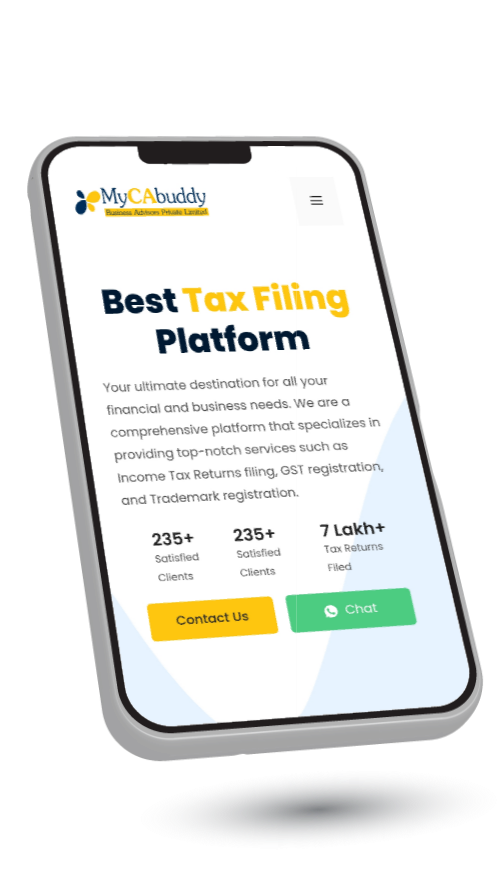Conversion of Proprietorship into Private Limited with MyCAbuddy
Converting a proprietorship into a private limited company marks a crucial milestone for entrepreneurs aiming to expand their business horizons and leverage the advantages of a corporate structure. While proprietorship offers simplicity, transitioning to a private limited company brings benefits like limited liability, better access to funding, and enhanced market credibility. In this guide, we’ll delve into the essential steps, legal requirements, and benefits of converting a proprietorship into a private limited company. Whether you’re a sole proprietor looking to scale up or an aspiring entrepreneur, this guide provides valuable insights into the conversion process and its implications.
Proprietorship Overview:
A proprietorship is a business owned and managed by a single individual, where the business and owner have no legal distinction. The proprietor is personally liable for all business debts and obligations, putting personal assets at risk. Access to funding options may be limited compared to other business structures. Ideal for small-scale businesses and self-employed individuals like freelancers, consultants, and small retailers.
Private Limited Company:
A private limited company is a business structure wherein shareholders privately own the company. Shareholders’ liability is limited to their share capital contribution, ensuring their assets are protected. Characterized by a minimum of two and a maximum of 200 shareholders. Shares are transferrable, providing flexibility in ownership.
Trusted by experts and businesses
Apply for Pvt. Ltd. Company
Key Differences:
Difference | Proprietorship | Private Limited Company |
Registration | Informal | Registered under the Companies Act, 2013 |
Legal Status | Not a separate legal entity | Separate legal entity under the Companies Act, 2013 |
Transferability of shares | Not transferable | Shares are transferrable |
Liability | Unlimited | Limited by the extent of shares |
Members | One member only | Minimum two members, maximum 200 members |
Taxation | Income tax is the same for the proprietor and the proprietorship | Profits are taxed at 30% surcharge and cess as applicable |
Compliance | – | Annual returns and accounts must be filed annually with the ROC |
Legal Framework:
Conversion is governed by the Companies Act of 2013 and the Income Tax Act of 1961 in India. The Companies Act specifies procedures, requirements, and compliances for the conversion process. The Income Tax Act outlines tax implications, benefits, and obligations associated with the conversion.
Benefits of Conversion:
Limited Liability: Shareholders’ assets are safeguarded, providing financial security. Separate Legal Entity: Ensures stability, credibility, and continuity in ownership or management changes. Access to Capital: Better access to funding through share issuance for expansion. Transferability of Ownership: Ownership is easily transferable through share transfers. Tax Benefits: Eligibility for tax deductions, exemptions, and reduced rates leads to significant tax savings. Enhanced Business Image: Enhances professionalism, credibility, and confidence, fostering better opportunities.
Requirements for Conversion:
Agreement: Enter into an agreement outlining terms and conditions of conversion. Memorandum of Association (MOA): Include an object clause in the MOA stating the intention to convert. Transfer of Assets and Liabilities: Transfer all assets and liabilities of the proprietorship to the company. Directorial Board and Shareholding: Proprietor should become part of the directorial board and hold a minimum of 50% voting power. Minimum Share Capital: Ensure compliance with the minimum share capital requirement.
Benefits with us
Work smarter, save money, and get expert guidance. We’re here to help you succeed.
- Streamlined Registration Process
- Compliance Assurance
- Cost Efficiency
- Employee Welfare
- Expert Guidance

Prerequisites for Forming a Private Limited Company:
Directors: At least two directors are required, one of whom can be the proprietor. Director Identification Number (DIN): Obtain DIN for all directors. Shareholders: Minimum of two shareholders, one of whom can be the proprietor.
Conditions for Conversion:
Transfer of Assets and Liabilities: Transfer all assets and liabilities of the proprietorship to the company. Shareholding and Voting Rights: Sole proprietorship should hold a minimum of 50% of shares in the new company. Minimum Shareholding Period: Sole proprietor should hold shares in the new company for a minimum of five years. Non-Monetary Consideration: Conversion should not involve any monetary consideration.
Documents Required for Conversion:
Identification and address proof of all directors. Property papers or lease agreement for the place of business. No Objection Certificate (NOC) if the place of business is rented. Recent utility bills displaying the address of the place of business.
Conversion Procedure:
Complete slump sale formalities. Obtain DIN and DSC for directors. Fill out the SPICE+ form and apply for name reservation. Prepare MOA and AOA. Apply for incorporation and obtain Certificate of Incorporation. Apply for PAN and TAN. Update bank details.
Frequently Asked Questions (FAQs):
Can I convert my sole proprietorship into a private limited company?
Yes, you can convert your sole proprietorship into a private limited company by following the legal procedures outlined in the Companies Act of 2013.
What are the advantages of converting to a private limited company?
Converting to a private limited company offers benefits such as limited liability, a separate legal entity, access to capital, transferability of ownership, tax benefits, and an enhanced business image.
What legal framework governs the conversion process?
The conversion process is governed by the Companies Act of 2013 and the Income Tax Act of 1961 in India. These acts provide guidelines, procedures, and compliances associated with the conversion.
How long does the conversion process take?
The duration of the conversion process may vary, but it typically takes a few weeks to complete all the necessary formalities, obtain approvals, and receive the Certificate of Incorporation.
Are there any tax benefits associated with conversion?
Yes, there are tax benefits associated with conversion, including eligibility for tax deductions, exemptions, and reduced rates, leading to significant tax savings for the newly formed private limited company.
Can I retain control over the company after conversion?
Yes, as the sole proprietor, you can become a director and retain control over the company. Ensure compliance with the minimum shareholding requirements and directorial responsibilities.
Do I need to fulfill any specific conditions before conversion?
Yes, you need to fulfill conditions such as transferring assets and liabilities, ensuring minimum shareholding, and holding shares for a specified period. Compliance with these conditions is crucial for a successful conversion.

